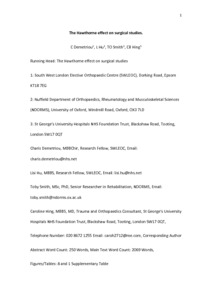Demetriou, C; Hu, L; Smith, TO; Hing, CB
(2019)
Hawthorne effect on surgical studies.
ANZ J Surg, 89 (12).
pp. 1567-1576.
ISSN 1445-2197
https://doi.org/10.1111/ans.15475
SGUL Authors: Hing, Caroline Blanca
![[img]](https://openaccess.sgul.ac.uk/113227/1.hassmallThumbnailVersion/DemetriouetalAAM2019.pdf)  Preview |
|
PDF
Accepted Version
Available under License ["licenses_description_publisher" not defined].
Download (275kB)
| Preview
|
Abstract
BACKGROUND: The Hawthorne effect or 'observer effect' describes a change in normal behaviour when individuals are aware they are being observed. This may have an impact on effect estimates in clinical trials. The purpose of this study was to determine if the Hawthorne effect had been recorded as a risk of bias in surgical studies. METHODS: A Preferred Reporting Items for Systematic Reviews and Meta-Analyses compliant literature search was conducted till March 2019. Eligible studies included those reporting or not reporting the Hawthorne effect in surgical studies from the following databases: MEDLINE, Embase, CINAHL, AMED, BNI, HMIC, PsycINFO, Web of Science, Cochrane Library, Google Scholar and OpenGrey. Two reviewers independently reviewed the papers, extracted data and appraised study methods using the Newcastle Ottawa Scale or the Cochrane risk of bias tool. Data were analysed descriptively. RESULTS: A total of 842 papers were identified, of which 16 were eligible. Six (37%) observational studies were identified with the aim of measuring the Hawthorne effect on their outcome with five reporting that the Hawthorne effect was responsible for the improvements in outcomes and one reporting no change in outcome due to the Hawthorne effect. Ten (63%) studies were identified, of which eight used the Hawthorne effect as an explanation to improvements seen in the control group or their secondary outcomes and two to compare their results with other studies. CONCLUSION: There is considerable between-study heterogeneity on how the Hawthorne effect relates to surgical outcomes. Further consideration on reporting and considering the importance of the Hawthorne effect in the design of surgical trials is warranted.
| Item Type: |
Article
|
| Additional Information: |
This is the peer reviewed version of the following article: Demetriou, C., Hu, L., Smith, T.O. and Hing, C.B. (2019), Hawthorne effect on surgical studies. ANZ Journal of Surgery, 89: 1567-1576, which has been published in final form at https://doi.org/10.1111/ans.15475. This article may be used for non-commercial purposes in accordance with Wiley Terms and Conditions for Use of Self-Archived Versions. |
| Keywords: |
Hawthorne effect, bias, observer effect, surgery, surgical studies, Bias, Clinical Studies as Topic, Effect Modifier, Epidemiologic, Humans, Outcome Assessment, Health Care, Surgical Procedures, Operative, Humans, Surgical Procedures, Operative, Effect Modifier, Epidemiologic, Clinical Studies as Topic, Bias, Outcome Assessment, Health Care, bias, Hawthorne effect, observer effect, surgery, surgical studies, Hawthorne effect, bias, observer effect, surgery, surgical studies, Bias, Clinical Studies as Topic, Effect Modifier, Epidemiologic, Humans, Outcome Assessment, Health Care, Surgical Procedures, Operative, Surgery, 1103 Clinical Sciences |
| SGUL Research Institute / Research Centre: |
Academic Structure > Molecular and Clinical Sciences Research Institute (MCS) |
| Journal or Publication Title: |
ANZ J Surg |
| ISSN: |
1445-2197 |
| Language: |
eng |
| Publisher License: |
Publisher's own licence |
| PubMed ID: |
31621178 |
| Web of Science ID: |
WOS:000490403300001 |
| Dates: |
| Date |
Event |
| 2019-12-17 |
Published |
| 2016-10-16 |
Published Online |
| 2019-08-24 |
Accepted |
|
 |
Go to PubMed abstract |
| URI: |
https://openaccess.sgul.ac.uk/id/eprint/113227 |
| Publisher's version: |
https://doi.org/10.1111/ans.15475 |
Statistics
Item downloaded times since 07 May 2021.
Actions (login required)
 |
Edit Item |



